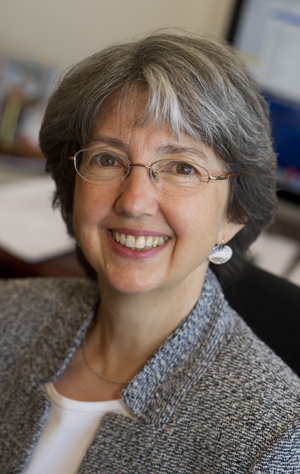Reinventing Education
BU associate provost joins board of higher-ed think tank

Last year, Elizabeth Loizeaux was asked to codirect a council on how technology might improve educational offerings at Boston University. Now the associate provost for undergraduate affairs and College of Arts & Sciences English professor has been asked to lend her expertise to other schools.
Loizeaux was named this month to a three-year term on the board of the Reinvention Center, a consortium of 66 American research universities that shares ideas to better undergraduate education. The center, located at the University of Miami, sponsors a biannual conference that produces papers on education issues and provides other resources to members.
Loizeaux’s latest charge should dovetail nicely with her role on BU’s Council on Educational Technology and Innovative Learning, which she cochairs. The group will host forums this semester, open to the community, for “exploring the directions we might go in developing educational technology and gathering ideas,” she says. Among the topics she has identified as possible innovations are massive open online courses (MOOCs), which permit people globally to take university courses for free, but without credit. BU Today talked with Loizeaux about the goals of the boldly named Reinvention Center and the challenges of envisioning the future of higher education.
BU Today: Does the center seek primarily technological innovations or does it advocate other changes (such as in teaching methods, course offerings and syllabi, length or structure of an undergrad education)?
Loizeaux: Consortium members are certainly interested in technological innovation, but the pressing issues the Reinvention Center considers range widely from, for example, how universities can best foster creativity and innovation to what graduates need to know for the 21st century to how diversity benefits education to access and student success to the changing requirements for accreditation.
American higher education is admired around the world. Why do we need to reinvent it?
The Reinvention Center takes its name from a 1998 Boyer Commission on Educating Undergraduates in the Research University report, Reinventing Undergraduate Education: A Blueprint for America’s Universities, which challenged universities to take full advantage of what makes them unique: their mission to produce new knowledge, new ideas, and new creative works—in other words, to do research. At BU, a number of the recommendations made by the commission have been adopted, resulting, for example, in many more opportunities for undergraduates to engage in original research. But great universities must always reinvent courses and curricula in response to new ideas, changing bodies of knowledge, new and emerging fields of study, and new and improved teaching techniques. Faculty constantly revise their courses, and departments and universities should always rethink their curricula periodically. The Reinvention Center can help us do this in an informed, creative way.
I know I’m addressing an English professor, but some people advocate more investment in career-specific disciplines and less in the liberal arts. Does the center have a position on that?
The center does not take positions on questions like that; it might, however, invite its members to explore such an issue at the biannual conference.
How might membership on the center’s board help you as you ponder recommendations to President Brown from BU’s technology council?
There was a lot of informal conversation at the Reinvention Center’s conference in November about online education (MOOCs in particular) and about how campuses are conducting university-wide discussions concerning the opportunities and costs of educational technology generally. Everyone is trying to figure out how to use technology to improve education and access to it. One of the most interesting aspects of the conversation is that advances in educational technology are encouraging us to think more concertedly about the special values, attributes, and benefits of residential education distinguished by a high degree of face-to-face interaction among students, faculty, and staff. Like us at BU, my colleagues across the country are considering how high-quality online courses could expand access and flexibility for students, how new pedagogical techniques developed for online courses can change and improve classroom teaching, and how online education could help us enhance what’s most valuable in a residential experience.
As an associate provost at a major research university and cochair of its technology council, what do you hope to contribute to the Reinvention Center’s board?
My position at the fourth-largest research university in the country—with its breadth of schools and colleges and its great diversity of faculty, staff, and students—gives me a wide perspective on both the opportunities and challenges that American research universities face right now. I bring that to the board along with my excitement and optimism about this transformational moment we find ourselves in. I do believe that higher education as we have known it for at least half a century is changing rapidly and that this is the moment to think freshly about what education is for, what matters to us, and how we are going to advance those values going forward. We need to keep a steady eye on what we’re about as we use and create the technologies that are changing how we live and work.
Comments & Discussion
Boston University moderates comments to facilitate an informed, substantive, civil conversation. Abusive, profane, self-promotional, misleading, incoherent or off-topic comments will be rejected. Moderators are staffed during regular business hours (EST) and can only accept comments written in English. Statistics or facts must include a citation or a link to the citation.